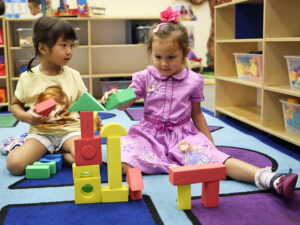Assertions about the "return on investment" to society from publicly funded preschool programs have varied over the years. In 2013, President Obama estimated the economic payback from each dollar invested at a $7 return, though The Washington Post's "Fact Checker" raised some objections.
Researchers from RAND looked at evaluations of 15 full-scale preschool programs in states and districts. Their study was unequivocal that public preschool programs produce "meaningful gains" in school readiness, as well as long-term cost-saving benefits like lower rates of special education placement.
There's a caveat though (and can we ever say this enough?): The programs that produce benefits must be high-quality, with an emphasis on intentional curricula, ongoing training and a supportive emotional climate.
Under those conditions, the researchers find an economic return of between $2 and $4 in benefits to society for each dollar spent. On an individual level, disadvantaged children benefit most from exposure to high-quality preschool.
|
|

A
new study from the Johns Hopkins School of Nursing looked at the impact of having low levels of social and behavioral school readiness on entering kindergarten in more than 9,000 Baltimore public elementary school students.
Key findings include:
- Students assessed as not "socially or behaviorally ready" in kindergarten (based on skills such as following directions and getting along with others) were significantly more likely to be held back a grade, receive a special education designation, and be suspended or expelled later in school.
- Boys were significantly more likely than girls to be considered not ready for school, and to experience these later academic problems.
The study authors recommend a greater emphasis on developing social and behavioral skills "well before children enter school" and suggest that special attention and more research should be directed to helping address boys' greater risk.
|
An Oakland
 Assemblyman has proposed legislation to create new kindergarten readiness standards in state-funded preschools, saying the bill would give low-income students and those learning English an equal shot at academic success.
Assemblyman has proposed legislation to create new kindergarten readiness standards in state-funded preschools, saying the bill would give low-income students and those learning English an equal shot at academic success.
But critics warn that the approach could lead to academic goals and teaching methods inappropriate for preschool-age children.
California should require all its preschool and transitional kindergarten providers to offer, at a minimum, part-day programs to all low-income families, with full-day programs available for all low-income families with working parents, the state Legislative Analyst's Office is advising.
The recommendations, contained in a review of Gov. Jerry Brown's proposed childcare and preschool budget for 2016-17, would cover 270,000 4-year-old children through both part- and full-day publicly funded programs. That would be nearly 50,000 more than the combined number of children now in the California State Preschool Program.
|
How often does this happen: A powerful elected official with a background in early education? KPCC radio reports that the new speaker of the California Assembly, Anthony Rendon used to run preschools for low-income children in Los Angeles. Child advocates and nonprofits looking to increase funding for early ed and concerned about Governor Brown's
new early education block grant proposal are looking to Rendon for help.
A new brief from the nonprofit Learning Policy Institute contains a useful checklist of 10 research-based elements necessary to build a high-quality preschool. Many of the items are familiar, such as ongoing support for teachers, but others (such as support for English learners and family engagement) are not always spelled out in discussions of quality. In addition to the brief, which can be downloaded at no charge at the link above, Learning Policy Institute provides a slide presentation and a video discussion. EdSource summarizes the study here.
|
CHECK OUT OUR RECENT ISSUES
|
|
|
|
|